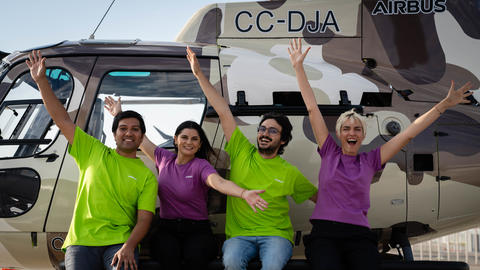Meet Vincent
Head of Multi-Intelligence Products & Solutions
Airbus Defence and Space
France
I am 45 years old and have been partially deaf since I was 7 years old. I declared my disability in 2012.
Can you tell us about your condition and how it has changed your life?
You've probably already taken part in a remote conference call where everyone present in a meeting room is talking at the same time. It's hard to understand anything in the hubbub. For me, it's the same thing, but in real life!
Does your state of health affect your professional life and working methods in any way?
In my particular case, it's a partial and invisible disability, so not many people are aware of it. It's possible for me to work without adapting my working environment, but I know that if I ever need to, the company will be able to offer me an accommodation adapted to my situation.
Seminars or round tables are the most difficult environments: in an open or noisy environment, if I can't see you, I can't hear you. As a result, I naturally prefer small groups and quiet environments.
If you could break one myth about your health, what would it be?
With a disability, you have to compensate in other ways. So if I look at you sideways or speak to you sideways, it's to hear you better, not to avoid your gaze face to face.
As far as I'm concerned, there's no need to speak very slowly or to over-articulate: I adapt and always find a way to hear you.
But every disability is different and working together may mean adjusting certain habits. That's why it's important to demystify disability and talk about it with your colleagues.
With a disability you can achieve the same results, but just in a different way.
Tell us three things you'd like all your colleagues to know about your illness, so that they can support you.
◾️ If you speak directly to me when I'm on the phone with someone else, I can't hear you: one conversation at a time.
◾️ I have preferential seating in the meeting rooms, so that I can hear you all as clearly as possible.
◾️ A very important point for me: it's also a source of personal pride to be able to cope with my disability on my own, so there's no need to be overprotective or ultra-preventative to help me. Just act normally: if I need your help, I'll let you know.
Do you have anything to add?
With a disability you can achieve the same results, but just in a different way (by getting round what you can't do). So let's stay open and inclusive.


